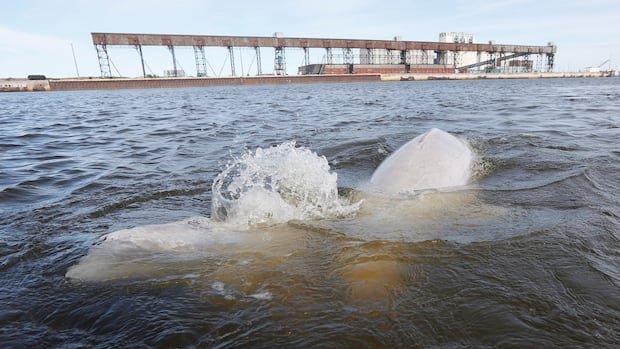Proposals aiming to broaden the Port of Churchill in northern Manitoba might lead to a surge in shipping activities and commercial operations. Some experts are concerned that this could impact the behavior of the region’s whales, which are not only a significant attraction for the nearly $100-million tourism sector but also a crucial food source for some northern communities.
Johnny Mamgark, who grew up in Arviat, Nunavut, recalls hunting beluga whales along the Hudson Bay shoreline since he was around 13 or 14 years old, a tradition deeply rooted in his culture. Mamgark, now residing in Winnipeg, emphasizes the necessity of whale hunting for survival in the North due to the high cost of living and food expenses.
Expressing his apprehensions, Mamgark worries that increased shipping and marine traffic near the Port of Churchill could disrupt the beluga whale population in the area traditionally hunted by his family and ancestors for generations.
Manitoba Premier Wab Kinew has advocated for a new or expanded port along the province’s coast as part of a major northern trade corridor to transport commodities like oil, liquefied natural gas, or hydrogen to European markets.
The Port of Churchill, owned and operated by Arctic Gateway Group, serves as one of Canada’s northernmost deepwater ports and is uniquely accessible by rail, offering Arctic Ocean access.
While plans for port expansion were not included in Prime Minister Mark Carney’s initial round of major infrastructure projects, future upgrades are anticipated. Community leaders are exploring ways to ensure Arctic wildlife can coexist with heightened marine traffic and commercial activities.
Beluga whales in the western Hudson Bay, estimated at 55,000 by Oceans North, frequently gather in the Nelson, Churchill, and Seal River estuaries during summer, attracting tourists and contributing significantly to Manitoba’s GDP.
These whales rely heavily on sound for various functions, including detecting predators like killer whales. Noise from ships poses a significant threat to their communication and behavior, potentially leading to adverse effects on the beluga population.
Efforts are underway to monitor and track beluga whales around Churchill through initiatives like “Beluga Bits,” aiming to mitigate the impact of marine traffic on these creatures and foster coexistence with increased shipping activities.
Discussions are ongoing in Churchill to balance economic growth with ecosystem preservation and Indigenous ways of life. Proposals for a national marine conservation area along the western Hudson Bay coastline aim to safeguard the region’s biodiversity and provide a framework for ecosystem management.
Christopher Debicki from Oceans North highlights the importance of carefully managing port expansion to prevent adverse impacts on beluga populations. Establishing a marine conservation area would further enhance ecosystem protection and monitoring efforts.
While Mamgark acknowledges the potential benefits of port expansion for local communities, he remains concerned about its impact on traditional ways of life and emphasizes the need for dialogue and collaboration between Manitoba and Inuit communities to address these challenges.

